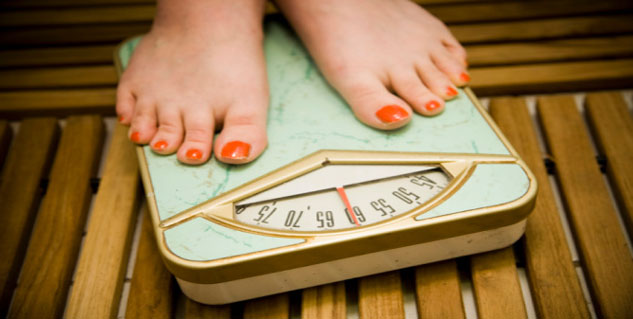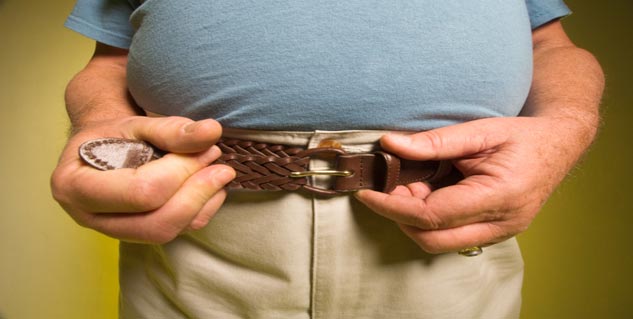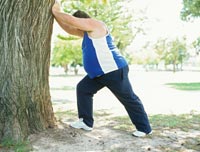Lose Weight > Common Sense To Lose Weight > Common Sense Article > Are You Wearing The Right Sized Bra?
Are You Wearing The Right Sized Bra?
How many times is it written in the press, and mentioned on the news that more than 80% of women are wearing the wrong sized bra? Frequently? Well, are you? Do you know whether your bra fits correctly?
Is it important? Do we really need to be that bothered? Well, the answer really has to be yes. Younger women can get away without wearing a bra, or wearing one that doesn't support them properly, as their young muscles and tendons keep things in place. But this doesn't go on forever, and as we age, we are all too keenly aware of the dreaded droop! And anyway, an ill fitting bra under a T-shirt or close fitting top is just so ugly.
There are other, potentially more serious problems though, especially if you have a curvy figure. Breasts that aren't properly supported can lead to all sorts of problems with your back, shoulders, skin irritations and self-esteem. If you have never been properly fitted, why not try it? You may well find the bras you buy in the future will completely change how you carry yourself, bringing your shoulders back and boosting your self-esteem considerably.
Although too many women are wearing bras that do not fit them correctly, there really is an over reliance on consistently buying the same size. We go into a store, are measured and told we are a 38G and off we go and buy only 38G bras.
It can often be just as well to throw away the tape measure and keep trying on bras until you get one that fits properly. If you rely too heavily on the tape measure, you stick in the comfort zone and continue to buy the same size. But there are far too many variables now in bra manufacture to be able to rely on that 'size' as a constant. Here are just a few:
1. The type of materials used
2. How the fabric is cut
3. The level of support/elasticity offered by the fabric
4. The design of the bra
5. The style of the bra (full cup, balconette, demi-bra, strapless, bustier etc )
6. Variations in sizing between brands
7. Variations in sizing conventions in different countries
8. Variables in the production process
9. Fashion sizing (i.e.: putting smaller sizes on the label than the garment actually is …)
…and all this before you even start to consider how your own body alters over the course of the day, the month, the year, or events such as pregnancy, measurable weight loss or gain, or surgery.
Therefore, the best way of ensuring you get a correct fitting bra is to try it on yourself. There are many guides to buying the correct size – some rely entirely on the tape measure, but many more are now moving towards the advice of trying on until the fit is right.
If the bra is right for you, it will:
1. Feel comfortable – there will be no red marks or wheals
2. The back band will be parallel with the front band
3. If it is underwired, the underwires will sit comfortably at the back of the breast without digging in. The front of the underwires will sit comfortably between your breasts and rest against your breast bone.
4. The cups will be full – not overflowing, and not sagging
5. The straps will not cut in, and they won't slip down.
When you do find a bra that fits properly, why not buy another one! There's nothing wrong with having a range of different 'sizes'. Bras from the same brands tend to be the same size, there will be different cup sizes in European and American makes and you may need different cup and back sizes to cope with changes in your body shape each month.
So, when you have bought the right bra for you, follow the care instructions to keep it doing its job as long as possible. Bras usually only have an effective life of around 5/6 months and will lose some elasticity each time they are washed. You will probably need to alter the straps and the hook position over that time to compensate for this.
Yes, there are too many women wearing the wrong sized bra.
Yes, it matters.
Yes, it is important to ensure the right fit.
No, you don't have to rely on the tape measure.
No, you don't have to buy the same size every time because you have been told to.
There is so much to choose from, enjoy trying on! Good luck in your search.
Related Articles
-
Common Mistakes When Choosing a Diet
As the New Year approaches, you have dec
-
Exploring the Fear of Judgement
All weight problems are simply a reflection of a lack of balance wi
-
10-Minute Huevos Rancheros
Huevos rancheros dont have to take a long time to prepare. Try thi
-
Stop Hunger Pangs Before They Start
There’s nothing more irritating than eating a meal and t
-
Tips On How To Lose Weight Quick And Simple
In this particular post we’ll chat about hypnosis for weigh
-
The 50 Million Pound Weight lOSS Challenge Tops 375,000 Lbs
Fourteen weeks into its 14-city U.S. tour, 173,143 people have joined
- DON'T MISS
- Are You SAD About Winter Weight Gain
- Very Best Fat Burning Workout Ever, Acquiring Fit Has Never Been Simpler
- Quick Weight Loss Tips - Fast Weight Loss Solutions for People On the Go
- Best Weight Loss Plan Must Haves
- Lose Weight Really Fast - 7 Secret Ideas Of Weight Loss Revealed!
- Red wine loosely linked to weight loss in mice
- How To Motivate Yourself To Lose The Weight
- 3 Healthy, Easy Ideas for When You’re Craving a Late Night Snack
- Why Youre Working Out But Still Gaining Weight
- The Need To Lose Weight Potential Health Problems Which Can Affect People Who Are Overweight




